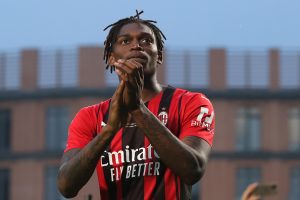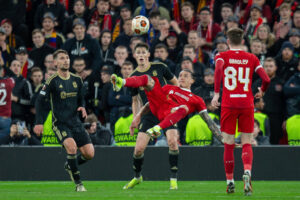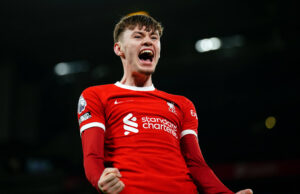Consistency is the sporting equivalent of the Holy Grail – the ultra-elusive but utterly priceless commodity or quality that everyone endlessly seeks. At the moment, perhaps nobody seeks it more than Mikel Arteta and his Arsenal team, who have rebounded from losing their first three Premier League games to win the next three, including the North London derby against Tottenham Hotspur last weekend. Now, as they prepare to travel to Brighton & Hove Albion, the surprise package of the Premier League season so far, both Arsenal and their manager must finally find some consistency if they are to continue progressing up the table.
Mikel Arteta Must Find Consistency at Arsenal
A Fine Result and Performance Against Spurs
It wasn’t so much the victory against Spurs that surprised many Arsenal fans as the manner of it, especially in the first half, when the Gunners produced probably the finest 45 minutes of Arteta’s entire time in charge at The Emirates, which in December will be two years in total. As Jermaine Jenas said in his analysis for Match of the Day 2, against Spurs Arsenal looked committed even from before the kick-off and they maintained that level of commitment all the way to half-time. By then, they were three goals up and virtually out of sight of a Spurs side who are currently operating like Arsenal in reverse, having won their first three league games but lost the next three.
Perhaps the performance against Spurs should not have been so surprising, because one of the characteristics of Arteta’s managerial reign has been Arsenal’s ability to raise themselves for the ‘big games’, namely those against the teams at the top of the table. Even amid the wreckage of last season, Arsenal still won away at Manchester United for the first time since 2006 and incredibly achieved a league double against Chelsea for the first time since the Invincibles season of 2003/04. Such results showed that Arsenal, at their best, can compete against even the best sides in the league.
But Too Often There is a Falling-Off
The problem for Arsenal is that too often after such surprising, even spectacular, performances they fall away equally spectacularly, losing or drawing against teams in mid-table or even at the bottom of the league, thus negating all the good work involved in beating one of the top sides.
So far throughout the Mikel Arteta reign, they have failed to produce a sustained period of good league performances, encompassing games against both the top sides and the lower-ranked ones. They need to do so now, beginning against Brighton, if they are to finally start achieving Arteta’s ambition of returning the club to its previous position of pre-eminence.
Put simply, that means there must be absolutely no lessening of the work rate, intensity or even sheer teamwork that was evident against Spurs, as was demonstrated to perfection by the length of the field inter-passing that produced the sublime second goal by Pierre-Emerick Aubameyang.
The Manager Must Be Consistent Too
Equally, however, Arteta himself must now start to show real consistency, both in selection and tactics. His has been a managerial tenure that has been beset by problems that nobody could have anticipated, in particular a pandemic that means he has still only played a dozen games in front of a home crowd.
However, what has really undone him before now have been the self-inflicted problems, when he has made utterly inexplicable decisions that have fatally undermined his team from the start. That, unfortunately, was most evident in the two legs of the Europa League semi-final against Villareal last season, when he first played away with a false nine and then effectively selected a one-man midfield at home.
Both of those decisions suggested that his biggest inheritance from Pep Guardiola, his former boss at Manchester City, is a penchant for making utterly indefensible decisions.
Who Will Replace Xhaka in Midfield?
The game against Brighton will be an acid test of Arteta and whether he has learned from such mistakes. Granit Xhaka, who for once played with real composure and tenacity against Spurs, suffered a late injury that has ruled him out for the next three months. In his absence, Arteta will clearly have to change a winning team, but how will he do so?
Logically, he should choose a like-for-like replacement, such as Albert Sambi Lokonga or even Ainsley Maitland-Niles. However, the fear is that he will be overly ambitious, a la Pep, and instead unbalance the whole side by dropping either Martin Ødegaard or Emile Smith Rowe back into midfield, as he did against Villareal in the second leg of the Europa League semi-final and again against Manchester City in the Premier League this season, after Xhaka was sent off.
It is precisely that kind of decision that Arteta should not make, especially now that, perhaps for the first time, his own Arsenal side is finally beginning to emerge. Perhaps the single most impressive, and indeed exciting, aspect of the win against Spurs was that Arteta’s Arsenal was really on display for the first time, with almost every player in the first 11, with the exception of Aubameyang and Xhaka, having either been signed by him or promoted by him from the youth or reserve sides.
The problem remains, of course, that the rest of the squad is still largely made up of the detritus from the end of Arsene Wenger’s time in charge and the year-long reign of Unai Emery. In time, those ‘legacy’ players must be moved on, so that Mikel Arteta can finally produce a squad with players good enough to challenge the first-team players for their places.
Nevertheless, that team, if it can maintain its own form and – crucially – avoid being undermined from within by any reckless decisions by its manager, might finally have the potential to begin producing the consistency that everyone associated with Arsenal, just like everyone else in sport, craves so badly.
Main Photo






